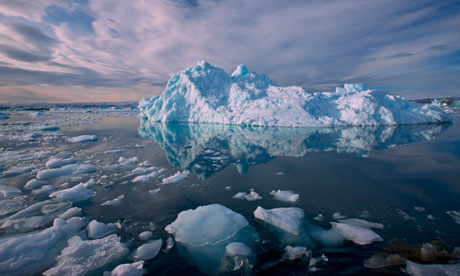Environmental science agencies told to help oil firms drilling in polar regions
Natural Environment Research Council says science agencies should help ‘de-risk’ investment by UK oil companies
- guardian.co.uk, Sunday 14 October 2012 16.04 BST

Some of Britain’s top environmental science agencies are being told to use their skills to help “de-risk” investment for UK oil companies in the polar regions.
The demands are contained in a consultation document on an already controversial move to merge the British Antarctic Survey (BAS) with the National Oceanographic Centre.
The “outrageous” new strategy direction is at odds with a House of Commons committee calling on the government to stop drilling by Shell in the Arctic over safety concerns and worries that the sea ice is melting faster than ever, warn critics.
Some banks have already decided they will not support operations in the far north, but the Natural Environment Research Council (NERC), which is pushing the tie-up between the BAS and the National Oceanographic Centre, says in its consultation brief: “A long-term vision is needed to equip UK business and UK investors with the edge needed for de-risking major investment decisions in hostile, unfamiliar environments.”
The merged group would seek to exploit opportunities by “strengthening the business and commercial expertise within a reshaped leadership team” while “building and broadening business engagement, particularly in the seeking of regional innovation clusters”, adds the NERC document, which was sent out ahead of a consultation exercise which ended earlier this week.
NERC is the UK’s main agency for funding and managing research in the environmental sciences and its desire to merge the two highly respected institutions has upset scientists and even some Conservative backbenchers.
Critics presumed the real reason for the merger was the desire to cut budgets but the consultation documents suggest it could also be partly about turning the combined body into a better support system for the business community.
Duncan Wingham, the NERC chief executive, said all scientific institutes were now under pressure to ensure they were providing value to the UK economy.
But he denied that a more business-focused approach meant that the council necessarily supported drilling in the Arctic, although future work would provide relevant information to oil companies.
“It is not the function of NERC to take a policy decision but to provide scientific information upon which someone else can make such a decision. There is no question there is a perceived tension between the regulatory approach to retaining a clean environment and on the other hand our [the UK’s] need to provide new energy supplies,” he said.
Greenpeace has recently launched a major campaign to make parts of the far north off limits to Big Oil and fears for the future of Antarctica as drilling picks up in areas such as the South Atlantic.
“The British Antarctic Survey is a world-renowned institution, and has done great work in helping us to understand and protect one of the most fragile and wonderful regions on the planet,” said the Greenpeace head, John Sauven.
“So dismantling this leading scientific centre and using the leftovers to do the bidding of oil companies is both wrong and outrageous. BAS must not be used to make it easier to extract resources from the Arctic and Antarctic. These regions need to be protected.”
NERC argues that putting the Cambridge-based BAS together with the National Oceanographic Centre in Southampton should make it more dynamic and insists budgets have been protected.
The environmental audit committee of the House of Commons warned in its report that the vulnerable Arctic region was being endangered by a misguided search for hydrocarbons.
“The shocking speed at which the Arctic sea ice is melting should be a wake-up call to the world that we need to phase out fossil fuels fast,” said the committee chair, Joan Walley MP. “Instead we are witnessing a reckless gold rush in this pristine wilderness as big companies and governments make a grab for the world’s last untapped oil and gas reserves.”
Since the report was unveiled last month, one of the world’s major oil companies, Total of France, has declared that it will not drill for oil, saying it realised a spill would ruin its corporate reputation.
